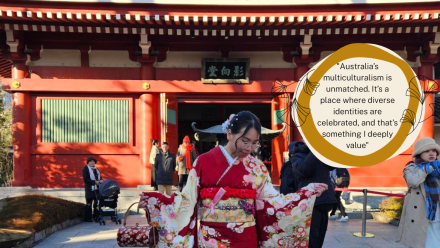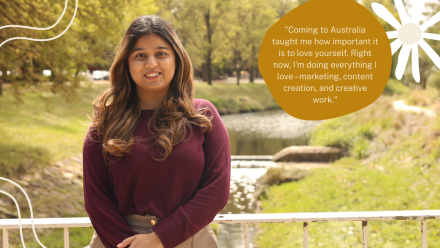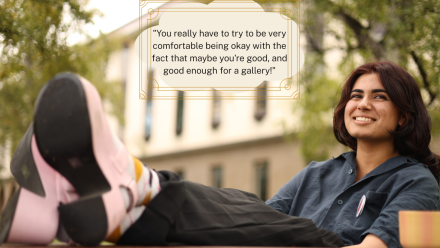Q&A with Michael Cooney
The policy project of the then Government is more interesting and more relevant to the Australia’s future than the politics of the Labor caucus in that time.
Australian politics hit a tumultuous patch between 2010 and 2013. As Prime Minister Julia Gillard traversed the pitfalls of a minority government, MICHAEL COONEY, BA (Hons) '96, MA '01, was at the heart of the action.
As Gillard's speechwriter, Cooney's role was to aid the national conversation. He came to the job a true Labor believer with years of experience behind him, but the stakes in the Prime Minister's Office were high.
After the election defeat in 2013, Cooney wrote about his rollercoaster ride, now published as The Gillard Project. He returned to ANU to launch the book and answered audience questions at an ANU/Canberra Times Meet the Author event.This article is published in the new ANU Reporter.
Subscribe to receive the next print edition of ANU Reporter.
You've had a long and ongoing relationship with ANU, how important is the University to you?
I like to quote James McAuley - I am fitted to this campus "as the soul is to the body". I was born about 25 minutes' walk south of here, at the old Canberra Hospital, gone now, of course. I first put money over the bar at the workers club, about 10 minutes' walk east.
This University is where I first heard Paul Keating speak, other than in the Parliament. It's where I joined his Labor Right and then his Labor Party in 1994.
Though I wasn't active in campus politics, I was active in the ACT ALP Branch and that's where I met Young Labor activists like ANU students Andrew Barr [now ACT Chief Minister] and Jim Chalmers [now Federal Member for Rankin]. I know there are some cracking young activists on this campus today.
I've spent a lot of time on campus since the first time I graduated, including studying in the old Department of International Relations, not long before the world changed in September 2001, and at the Crawford School [of Public Policy] for a happy season in 2013.
Why did you write The Gillard Project?
I never wanted to settle scores. In part, the approach I took was because my honest analysis of the period 2010-2013 is that the policy project of the then Government is more interesting and more relevant to the Australia's future than the politics of the Labor caucus in that time.
In part, I also think the contest between Labor and conservativism is a more important explanatory factor in understanding what happened to the country than either the contest within Labor or the occasional failings of Labor's strategy or culture.
For me, things begin in Labor, they begin with and through Labor; this is a story worth telling.
Arguably Julia Gillard's most famous speech was her misogyny speech which you didn't play a large role in. Did that frustrate you?
The most frustrating thing was that I missed the first half of it! It was after question time and I was trying to get some work done. On that day, I was tapping away on some boring economics speech that no one will ever remember and I looked at the TV that was on mute and I thought she looked like she was having a go at [Tony Abbott].
I turned the volume up and he was checking his watch and she was tearing his head off for it. It was fantastic.
It's a confronting moment for any speechwriter when the speech that goes around the world is one that [the politician has] written 500 times herself in the shower, while walking, while stopped at the traffic lights.
What it tells me is that they could all write good speeches if they had time but we expect politicians to do everything else so it's hard for them to get it done.
What is the integrity of partisanship?
I am a partisan. The partisan, as a thinker and a writer, doesn't have a romantic image. Thanks to George Orwell, our image of the partisan mind and voice is that of duckspeak and doublethink.
As appealing as Orwell's deep integrity is, for the political person, though, his is a paradoxical image; there is a kind of despair at politics at work in that conception of the political saint as the man outside the system.
It's my view that judging the integrity of the partisan is inseparable from judging the conduct of the party he or she signs up to - inseparable from an actual political judgement about the rights and wrongs of the parties.
You can't judge it from a stance of false neutrality. Orwell is a saint, not because he rejected solidarity, but because he rejected Stalinism.
What were the processes and practicalities of working with the bureaucracy while in the Prime Minister's Office?
It's really hard for the bureaucracy to effectively support speechwriters. As a former public servant myself, I think this is because it's so quintessentially personal. You can't start a speech early, no more than 10 days out really. Appropriately there are conservative time frames in the public service which means they can't really turn it around in that kind of time.
On international speeches, there was quite a variety of official advice inputs and they didn't just go to checking, they went to decide what the policy was. This happened particularly in Afghanistan speeches. It felt like we were negotiating policy through negotiating the speech.
Who would you have liked to have written for in the past? Who would you write for now?
I would have loved to have written for TJ Ryan - the Queensland Premier in World War One who stood against conscription and stood against [then Prime Minister Billy] Hughes. Ryan's death was the great calamity of Labor in the 1920s. He's a large figure who could have kept Labor a national not a sectional party in the period. When you think about how poorly Australia was governed in the 1920s, his death was a great tragedy for Australia too.
[NSW Labor leader] Luke Foley is an interesting guy. He's got a big job in front of him and I have some hope and confidence about what he's going to do in NSW. NSW Labor needs, in some respects, a new model and Foley is a thinker.
Click here to listen to Cooney's talk in full.
Subscribe to the Experience ANU newsletter at anu.edu.au/events to find out about future Meet the Author events.


